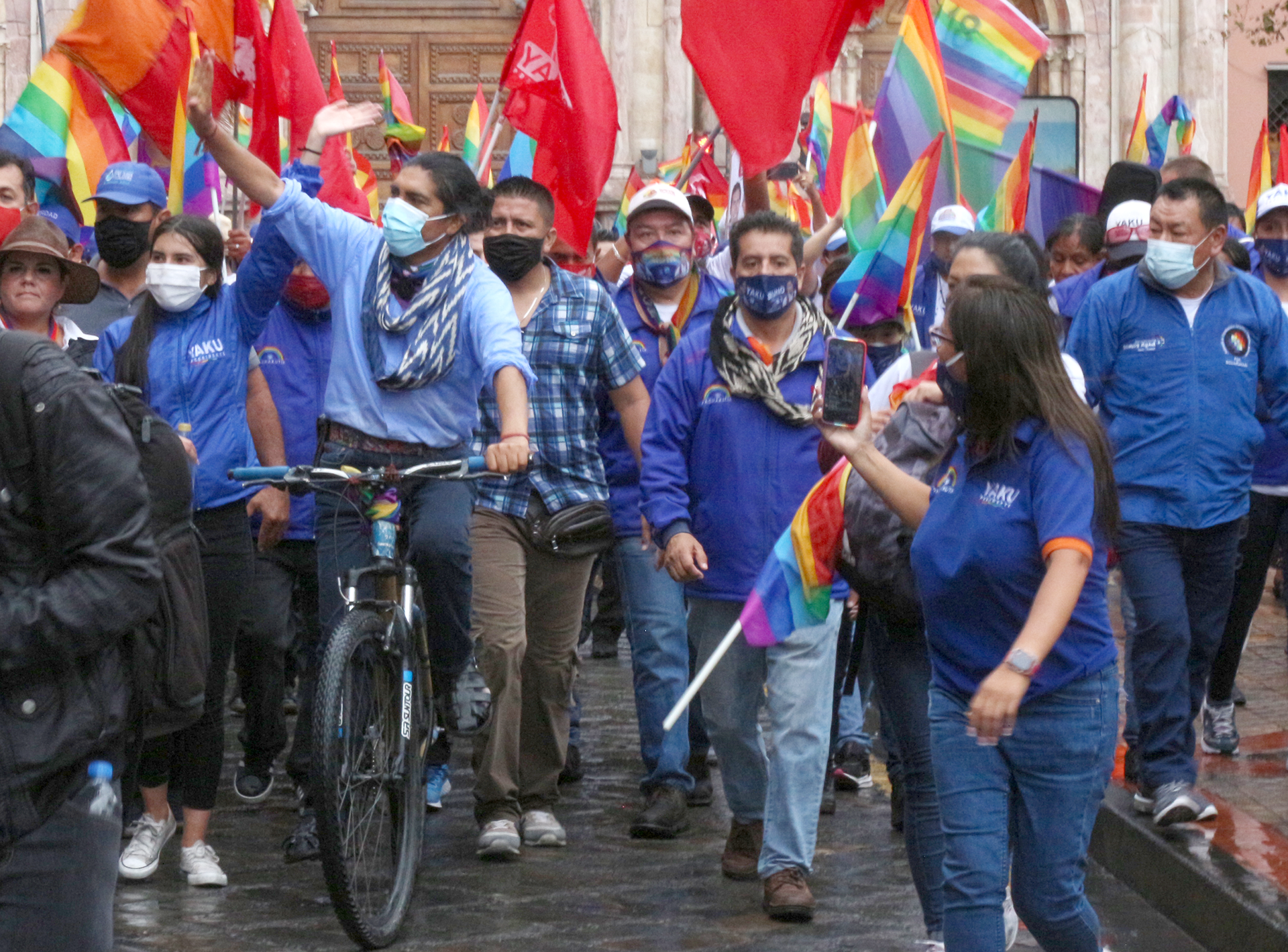
Hundreds of indigenous protesters rallied outside the offices of Ecuador’s National Electoral Council (CNE) in Quito Feb. 23 to demand a recount of the presidential vote. Third-place finisher Yaku Pérez of the indigenous-based Pachakutic party, eliminated from the run-off election to be held in April, led a week-long cross-country march of his supporters from Loja province in the south which repeatedly blocked traffic on the Pan-American Highway before arriving in the capital for the rally. He then led a delegation to the CNE office, carrying boxes with more than 16,000 statements purporting to show irregularities. At the demonstration, his supporters chanted, “Transparency yes, fraud no!”
Official results of the Feb. 7 poll showed left-populist Andres Arauz, former head of the Central Bank under then-President Rafael Correa, with nearly 33% of the vote, followed by right-wing candidate Guillermo Lasso, also a former banker, with 19.74%—enough to narrowly edge out Pérez, who got 19.39%. Pérez is demanding a recount in 17 of Ecuador’s 24 provinces, involving some 6 million ballots—about 45% of the country’s registered voters.
When the CNE failed to act on the complaints, Pérez supporters again erected flaming barricades to block traffic on the Pan-American through Loja province on March 1. (El Comercio, Quito, March 1; Al Jazeera, El Comercio, Feb. 23; PRI, Feb. 22; El Universo, Guayaquil, Feb. 17)
Deadly prison uprisings
As the rally was underway in Quito, Latin America’s deepening prison crisis came to Ecuador in no uncertain terms, as simultaneous riots at four facilities left 79 people dead. Government Minister Patricio Pazmino stepped down in the wake of the uprisings, which hit prisons in the cities of Guayaquil, Cuenca and Latacunga. The fighting between rival gangs was seemingly set off by the Dec. 28 assassination in Manta of Jorge Luis Zambrano AKA “Rasquiña,” leader of a prominent criminal network known as Los Choneros. The port city of Manta has become an important hub for cocaine trafficking to Central America.
In 2019, President Lenín Moreno declared a state of emergency in Ecuador’s prison system after at least 24 were killed in a wave of incidents. The system, designed for some 27,000 inmates, still houses about 38,000, despite a reduction in response to the COVID-19 pandemic. (Al Jazeera, March 6; InSIght Crime, Feb. 27; Al Jazeera, NYT, Feb. 23)
Photo of Yaku Pérez, on bicycle, via Wikipedia





Rightist prevails in Ecuador election
Conservative former banker Guillermo Lasso won a surprise victory in Ecuador’s April 11 run-off election, edging out left-wing rival Andrés Arauz. The bond market reacted favorably as Lasso pledged upon his win to cut deficits and strike new oil deals.
Indigenous alliance CONAIE urged its supporters on to spoil their ballots in the run-off, after a court denied a request by candidate Yaku Pérez for a recount of first-round election results. This despite an effort by CONAIE leader Jaime Vargas to get the organizaton to support the candidacy of Arauz. (Bloomberg, Al Jazeera, Reuters, Reuters, Prensa Latina, NACLA)
Ecuador: state of emergency after deadly prison riots
Ecuador on July 22 declared a state of emergency in its penitentiary system after riots at two prisons left 22 dead and 57 wounded. President Guillermo Lasso issued the order “to mobilize all necessary human and economic resources to re-establish order” in Ecuador’s prisons. The military has been deployed to control the prison perimeters.
Among the wounded at prisons in Guayas, in southwestern Ecuador, and Cotopaxi, in the center of the country, were eight police officers who were sent in to quell the unrest. (AFP)
New deadly prison uprising in Ecuador
Hundreds of police officers stormed the Coastal Penitentiary outside Guayaquil, where more than 100 inmates were killed in an uprising this week. President Guillermo Lasso has declared a state of emergency that gives military personnel control of the prisons and puts inmates in strict lockdown. (NYT)
Ecuador declares emergency over narco-violence
Ecuador’s President Guillermo Lasso has declared a state of emergency in the country grappling with a surge in drug-related violence, and ordered the mobilization of military troops in the streets. (TRT World)
Ecuador: protesters block roads over gasoline price hikes
Thousands of protesters took to the streets of Ecuador’s cities as part of a paro nacional, setting up roadblocks and clashing with police. The strike was called to oppose President Guillermo Lasso’s economic policies. The demonstrations come days after the conservative leader announced a hike in gasoline prices. (Al Jazeera, DW)
New deadly fighting at Guayaquil prison
At least 68 prisoners have been killed in new fighting at Ecuador’s Litoral Penitentiary in Guayaquil where more than a hundred inmates died in clashes between rival gangs in September. (BBC News)
Another deadly prison uprising in Ecuador
At least 12 were killed and several injured in a clash between rivals gangs at a prison in Ecuador on April 3. The confrontation took place at El Turi prison in the city of Cuenca. Violence in Ecuador’s prisons, which the government says is related to gang disputes over drug trafficking, killed 316 people last year. (Reuters)
Another deadly prison uprising in Ecuador
At least 43 inmates have been killed in Ecuador’s latest deadly prison riot. Fighting broke out between rival gangs Los Lobos and R7 at a prison in Santo Domingo, some 80 kilometers east of Quito. (BBC News)
Another deadly prison uprising in Ecuador
At least 13 inmates were killed in a new riot at Ecuador’s Bellavista prison in Santo Domingo, about 80 kilometers southwest of Quito. (BNO News)